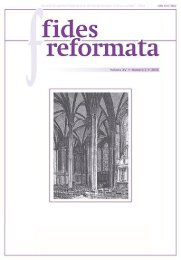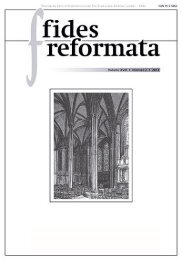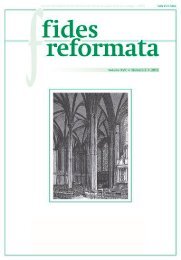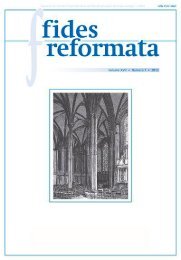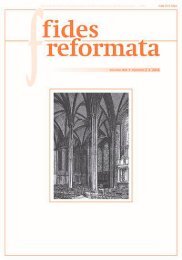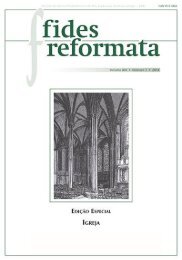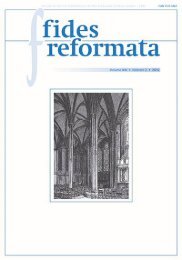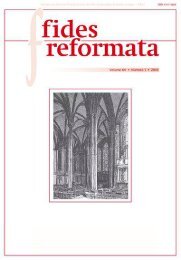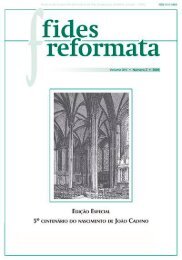You also want an ePaper? Increase the reach of your titles
YUMPU automatically turns print PDFs into web optimized ePapers that Google loves.
FIDES REFORMATA XX, Nº 1 (<strong>20</strong>15): 89-105<br />
and whom later theologians are indebted to for their theology of a covenant of<br />
works, it seems clear that this <strong>do</strong>ctrine is already present in Calvin in seminal<br />
form. Lillback concludes: “The arguments affirming that Calvin taught a covenant<br />
of works in an inchoative sense appear conclusive.” 25<br />
2. the beginning of the administration of the<br />
covenant of grace and the noahic covenant<br />
For Calvin, all true believers after the Fall are under the covenant of<br />
grace. In the two most important chapters in the Institutes regarding Calvin’s<br />
views on the <strong>do</strong>ctrine of the covenant, chapters 10 and 11 of Book II, the reformer<br />
affirms that to Adam was given the first promise of salvation. 26 Calvin<br />
was referring to the text of Genesis 3:15, which later became known among<br />
covenant theologians as the protoeuangelion. 27 This certainly explains why<br />
Calvin frequently uses the following sequence of persons when dealing with<br />
redemption in its revelation, accomplishment and application: “Adam, Noah,<br />
Abraham.” In his argument in the commentary on the book of Genesis, Calvin<br />
affirms that the covenant between God and his people dates back long before<br />
Moses. Those whom he would free had already been informed through their<br />
fathers about the covenantal relation between Yahweh and Israel and this was<br />
a knowledge “entirely uncontroverted among them.” 28 For Calvin, salvation<br />
after the Fall begins to be revealed to Adam and progressively passes on to<br />
other patriarchs until its full consummation in Christ. 29<br />
25 Lillback, “Ursinus’ Development of the Covenant of Creation,” 288.<br />
26 For an excellent summary on the importance of these two chapters in the understanding of<br />
Calvin’s covenantal thought see Calvin, Institutes, 1:428n1.<br />
27 Calvin, Institutes, 1:446. It is important to note that while Calvin interprets Genesis 3:15 as<br />
pointing to the salvation of sinners, he rejects the association of the word “seed” with the Lord Jesus<br />
Christ. Such interpretation for Calvin is a violent distortion. His reasons are two: one exegetical and<br />
another historical. He identifies the term as a collective noun and simply cannot understand how it can<br />
be applied to one man only as such. Moreover, throughout human history as revealed in Scripture Calvin<br />
sees that victory over Satan (who used the serpent to tempt Adam and Eve) is promised to elect humankind.<br />
Calvin concludes: “I explain, therefore, the seed to mean the posterity of the woman generally.<br />
But since experience teaches that not all sons of Adam by far, arise as conquerors of the devil, we must<br />
necessarily come to one head, that we may find to whom the victory belongs.” Calvin, Commentaries on<br />
Genesis, 1:170. In his sermon on this text Calvin uses Genesis 3:15 as an encouragement to Christians in<br />
their battle against Satan. After explaining from the pulpit the same opinion present in his commentary,<br />
he affirms: “Now, since we have the natural meaning of this passage, let us think seriously about taking<br />
advantage of it. In the first place, as I have already said, let us be thoroughly convinced that we must<br />
fight against Satan if we want to serve God and be considered among the number of his children.” John<br />
Calvin, Sermons on Genesis 1:1 - 11:4. Forty-nine Sermons Delivered in Geneva between 4 September<br />
1559 and 23 January 1560, trans Rob Roy McGregor (Carlisle, PA: Banner of Truth, <strong>20</strong>09), 289.<br />
28 Calvin, Commentaries on Genesis, 1:59, 65-66.<br />
29 For the occurrences of the expression see Calvin, Institutes, 1:70, 434. It also appears in Book 4,<br />
viii, 5 as he deals with the Church and its possession of divine revelation. For Calvin, Adam and Noah<br />
were also to be regarded as patriarchs just like Abraham, Isaac and Jacob.<br />
95





